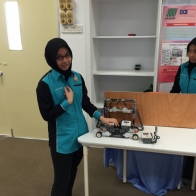
Through this project, the IBE further intends to foster south-south cooperation, where Malaysia will share its expertise on the inclusion of girls into the STEM field.
School visit in Putrajaya
The IBE also had the opportunity to visit a girls’ boarding secondary school in Putrajaya - considered as a gifted prestigious high performance school – in order to learn more about girls’ participation in science, technology, engineering and mathematics (STEM) education. In total, the school has 870 students, from ages 13 to 17, and a staff of 75 teachers. The school schedule is from 7.30 to 16.30, and the instruction language is a mixture of Malay and English. In addition to English, students have to select another language from Arabic, Chinese, French and Japanese. The students are selected based on their school achievements in primary education and their performance in the national examination taken at the end of primary school, and the representation is quite heterogeneous with regard to the social profile.
In addition to the national curricula common to all schools, this school’s niches are music (orchestra), sports (basketball/hockey) and research development in science, implemented as extra-curricular activities. In order to facilitate the use of ICT to support science projects, the school has high-speed internet access. The school also has a UNESCO Club of Science. Within the extra-curricular activities, the school – with the cooperation of national public agencies (including universities) - selected a diverse range of projects for implementation which were brainstormed and proposed by the students themselves. The students presented a series of project innovations, among them: Eco-Wall Simple Heat Insulator to turn agriculture waste into valuable products; Cassava Green Paper to explore the potential of cassava to produce alternative paper; MLX Elaesi (MLX functions as an oil absorber); Darth Walzer to produce a robot to paint walls, and also an Eco-Wall to slow down noise from outside. During a conversation with a group of students they expressed a diverse range of interests about their motivation to learn, their experience of group work, their science projects, and future projects they hope to study in higher education.
Seri Puteri is one of many UNESCO Associated School Project Network (ASPnet) schools in Malaysia and has also established its UNESCO Club to promote understanding, encourage civic awareness as well as environmental awareness.
To learn more about the school: http://www.seriputeri.edu.my/v1/